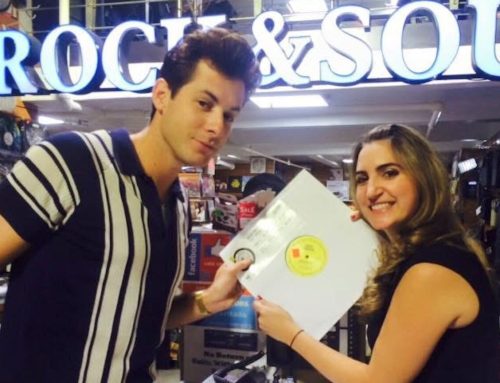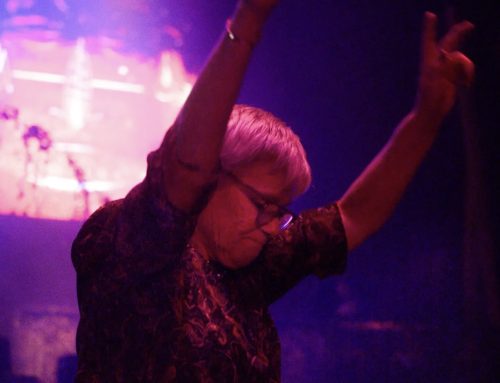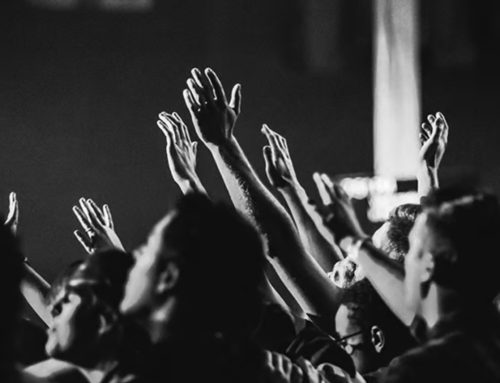
Vocalist Amanda Cruz during a project recording session for Bring Down the Walls. Photograph: César Martínez
In 1986, British artist Phil Collins (not the singer, but the Turner prize-nominated artist) was 16 years old when he first attended his first acid house party, and he noticed two things upon stepping inside the Haçienda nightclub in Manchester – everyone was wearing baggy clothes and the club was half empty.
“It didn’t get full until 1987, when house music, ecstasy and MDMA – MDA at that time – really kicked off,” Collins said to the Guardian. “Between 1987 and 1994, the rave scene started emerging and it was emphatically political, on some level.”
Collins draws upon his nightlife early years for his forthcoming exhibition, Bring Down the Walls, which kicks off on 5 May at Manhattan’s historic firehouse, Firehouse, Engine Company 31. All month long, it will be turned into a politically charged nightclub.
“Clubbing has always been political,” said Collins. “The vogue scene, LGBT clubs, gay and lesbian clubs – they are definitions of freedom.”
But it’s not only a space to dance, but one to foster a debate around America’s prison system. “Switch on the TV and see endless reports on the legal system, police brutality and lawyers, trials, which is our main focus in pop entertainment,” said Collins. “It is represented as a violent, sensationalized
According to a 2016 report from the US Bureau of Justice Statistics, America has the largest prison population in the world with 1.5 million inmates behind bars. It isn’t cheap, either, as the country’s spending on prisons has tripled since 1980.
To help those in need, Collins is releasing a benefit album, which features classic house covers recorded by former convicts alongside New York’s underground musicians. All proceeds are going to Critical Resistance, a New York group advocating for jail prevention.
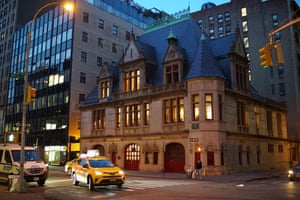
This project honors Bring Down the Walls, an often overlooked 1986 album and namesake song by Chicago record producer Larry Heard and musician Robert Owens. “It’s one of the greatest house records ever, it totally changed my life,” said Collins. “It brings everything together for the whole project.”
The song was written on toilet paper by Owens while he was working in the shipping and receiving department at Evanston hospital in Chicago; it quickly became the voice of the underground, marking the beginning of house music.
Collins draws a parallel between the growing popularity of house music and the rise of prison intake. “This notion of cash bail, detention, sentencing and parole are all targeted towards rolling back civil rights gains,” he said. “While the 1980s criminalized people and locked them up, queer and black musicians changed everything in emancipatory ways that built bridges between class, gender, sexuality and race.”
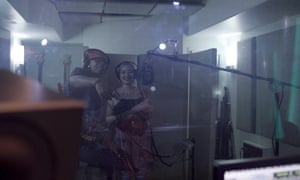
To Collins, there is a strong correlation between the two, more so than most realize. “These two things go hand in hand,” he said. “The body is locked up and punished, but house music is a place of transformation in a place of oppression; their spirit is free.”
House music did make its way to the top of the charts in the 1990s, but many underground classics are overlooked, which is why he wanted to make an album of cover songs. “They’re still marginalized when they’re so vividly important,” said Collins.
The album features house icons like Heard and Owens, “my two biggest heroes”, said Collins, alongside cameos from Kyp Malone from the TV on the Radio, R&B vocalist Ian Isiah and MikeQ, a DJ in the queer ballroom subculture who is hosting a House of Vogue party on 12 May.
The firehouse will also feature talks and workshops hosted by Black and Pink, an organization of LGBT prisoners, and Baz Dreisinger, author of Incarceration Nations.
“There is a point and a profit in locking people away – and choosing who is locked away subverts race and ethnicity, so what does it mean to be trans or queer in prison?” asks Collins. “There are so many things that still remain invisible to us.”
- Bring Down the Walls begins on 5 May at Firehouse, Engine Company 31 in New York
Original article here!!!>>>>>>>>>>>>
The Guardian
